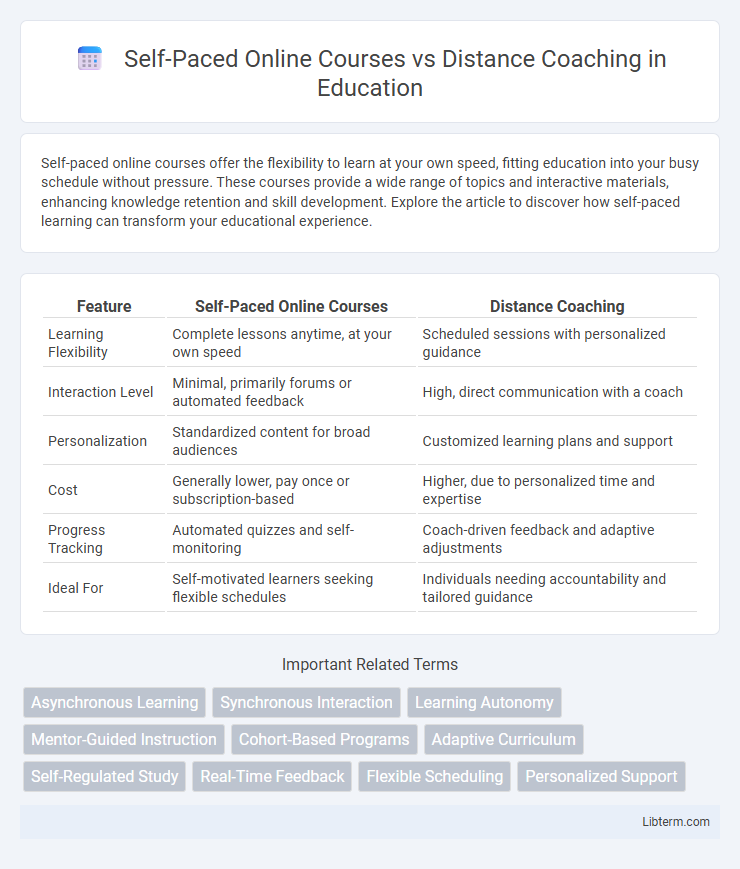Self-paced online courses offer the flexibility to learn at your own speed, fitting education into your busy schedule without pressure. These courses provide a wide range of topics and interactive materials, enhancing knowledge retention and skill development. Explore the article to discover how self-paced learning can transform your educational experience.
Table of Comparison
| Feature | Self-Paced Online Courses | Distance Coaching |
|---|---|---|
| Learning Flexibility | Complete lessons anytime, at your own speed | Scheduled sessions with personalized guidance |
| Interaction Level | Minimal, primarily forums or automated feedback | High, direct communication with a coach |
| Personalization | Standardized content for broad audiences | Customized learning plans and support |
| Cost | Generally lower, pay once or subscription-based | Higher, due to personalized time and expertise |
| Progress Tracking | Automated quizzes and self-monitoring | Coach-driven feedback and adaptive adjustments |
| Ideal For | Self-motivated learners seeking flexible schedules | Individuals needing accountability and tailored guidance |
Understanding Self-Paced Online Courses
Self-paced online courses offer learners the flexibility to access material anytime and progress according to their own schedule, making them ideal for individuals balancing work, study, or personal commitments. These courses often include pre-recorded lectures, quizzes, and assignments, allowing learners to revisit content repeatedly for better comprehension. Unlike distance coaching, which involves scheduled interaction with instructors, self-paced courses emphasize autonomous learning and time management skills.
What is Distance Coaching?
Distance coaching involves personalized guidance and support delivered remotely, typically through video calls, phone, or messaging platforms, enabling real-time interaction between coach and learner. This method tailors learning to individual needs with ongoing feedback, unlike self-paced online courses that offer pre-recorded content for independent study. Distance coaching enhances accountability and motivation by fostering a direct coaching relationship, leading to more focused skill development and goal achievement.
Key Differences Between Learning Formats
Self-paced online courses enable learners to access pre-recorded content and progress independently without fixed schedules, offering flexibility and personalized pacing. Distance coaching involves real-time interaction with instructors through video calls or messaging, providing tailored guidance and immediate feedback. The primary difference lies in the level of direct support and interaction, where self-paced courses emphasize autonomy and distance coaching emphasizes personalized mentorship.
Flexibility and Convenience Compared
Self-paced online courses offer unmatched flexibility by allowing learners to access content anytime and progress according to their own schedule, making them ideal for busy individuals or those balancing multiple commitments. Distance coaching provides personalized guidance through scheduled sessions, which may limit timing options but offers real-time interaction and tailored feedback. Both methods enhance convenience by eliminating the need for physical presence, yet self-paced courses excel in adaptability while distance coaching prioritizes customized support.
Instructor Interaction: Live vs. Asynchronous
Self-paced online courses offer asynchronous learning where students access pre-recorded content and complete assignments at their convenience, resulting in limited real-time instructor interaction. Distance coaching typically involves live sessions, enabling direct, immediate feedback and personalized guidance from instructors. This live interaction fosters deeper engagement and quicker clarification of doubts compared to the delayed responses common in self-paced formats.
Personalized Feedback and Support
Self-paced online courses offer flexibility but often lack real-time personalized feedback, limiting immediate interaction with instructors. Distance coaching provides tailored guidance through direct communication, allowing for customized support that addresses individual learning needs effectively. Personalized feedback in distance coaching enhances skill development by adapting to learner progress, unlike the fixed structure of self-paced courses.
Learning Pace and Student Autonomy
Self-paced online courses offer learners complete control over their study schedules, allowing them to progress at their own speed and revisit materials as needed, enhancing personalized learning experiences. Distance coaching provides structured guidance with scheduled sessions and real-time feedback, promoting accountability while still enabling some degree of flexibility. The choice between these modalities depends on the learner's preference for autonomy versus tailored support in managing their educational journey.
Cost Comparison: Which is More Affordable?
Self-paced online courses typically offer lower costs due to their pre-recorded content and lack of personalized interaction, making them more budget-friendly for learners seeking flexible study options. Distance coaching often involves higher fees because of individualized guidance, real-time sessions, and tailored feedback, which require more time and resources from instructors. Comparing average prices, self-paced courses can range from $50 to $300, whereas distance coaching services frequently start at $500 and can exceed $1,500, highlighting a significant affordability gap for most learners.
Ideal Learner Types for Each Method
Self-paced online courses suit independent learners who thrive on flexible schedules and self-motivation, allowing them to absorb material at their own pace and revisit content as needed. Distance coaching benefits individuals seeking personalized feedback and accountability, ideal for those who require structured guidance and real-time interaction to achieve specific goals. Matching learning preferences with these formats enhances engagement and outcomes, making the choice critical based on learners' autonomy and support needs.
Making the Right Choice for Your Goals
Self-paced online courses offer flexibility and personalized learning that suits learners aiming for convenience and independence. Distance coaching provides tailored guidance and direct interaction with experts, ideal for those seeking accountability and customized support. Choosing between these options depends on your learning style, time availability, and specific development goals to ensure effective skill acquisition.
Self-Paced Online Courses Infographic

 libterm.com
libterm.com